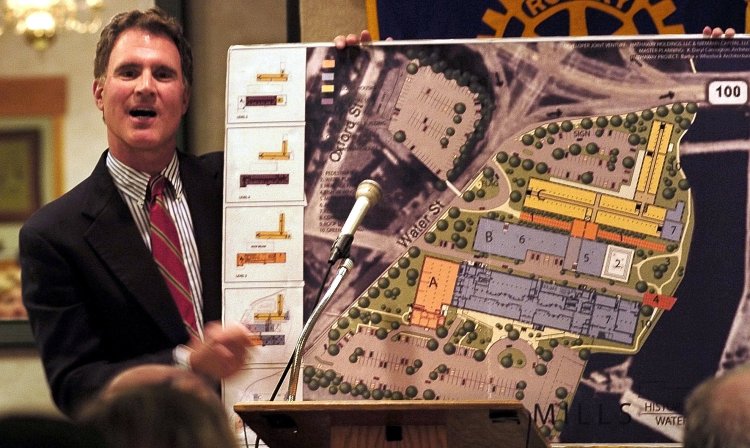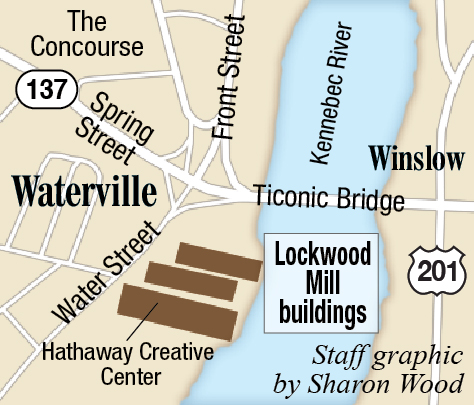WATERVILLE — It’s a go. Two buildings at the former Lockwood Mills complex are on their way to becoming home to 132 apartments and up to 10,000 square feet of commercial space at the juncture of Waterville’s Main Street and the city’s South End.
Waterville’s Planning Board and City Council took crucial final votes Monday and Tuesday on plans that will enable North River Co. — a real estate investment, development and management firm that specializes in brick and beam mill conversions — to take on the complex Waterville project that other developers have tried and failed to turn around.
The imminent bump in the city’s housing stock — which has been squeezed tight for years — will enable more talented workers to live in the community, said Garvan Donegan, director of planning and economic development for the Central Maine Growth Council. Units will be sold at both market rate and discounted rate prices for residents who make 50%-60% of the area’s median income, but often fill some of the area’s most important jobs, including firefighters, police officers and teachers. The opening up of sizable commercial space will also create opportunities for new businesses to take root and boost the local economy, according to Donegan.
With the Planning Board unanimously approving subdivisions for the two mill buildings next to the current Hathaway building on Water Street Monday night, North River is now able to start nailing down funding. The company is seeking more than $10 million from Maine Housing tax credits for the first phase of renovations, estimated to cost $21 million in total. It also plans to apply for state and federal historic tax credits, Brownfield funding from the Environmental Protection Agency and to take out a loan. The company could not apply for tax credits without the planning board’s approval of its project, according to Mariah Monks, a project manager and director at North River.
The board’s decision came with a series of conditions from the Kennebec Water District, the State Fire Marshal’s Office, the Waterville Fire Department, the Waterville Sewerage District and the Maine Department of Transportation, which City Engineer Nick Champagne said are “pretty routine for a project of this size.”
“The reason for the conditions is just to make sure that the building meets current codes and standards,” Champagne said.
As part of the agreement, Waterville’s planning board granted North River three years to start the redevelopment project and a deadline of Aug. 5, 2023, to complete it.
The City Council helped make the project more viable Tuesday evening by finalizing a tax increment financing plan for the development. In a 6-0 vote, councilors agreed to split the two mills from the current downtown TIF district in a move comparable to what the council did for the creation of the Bill & Joan Alfond Main Street Commons building. The council then voted 5-1 to create a new TIF district for the buildings. Councilor Phil Bofia, R-Ward 2, opposed the move. Councilor Winifred Tate, D-Ward 6, was absent after resigning from the council earlier Tuesday afternoon.
Bofia wanted the 30-year TIF to reimburse North River 50% of the taxes it pays the city of Waterville rather than 75% of the taxes it pays, as recommended by the TIF Advisory Committee. Donegan said that the process of getting affordable housing tax credits in Maine is competitive and that the most successful projects are the ones that have the 75% credit enhancement agreements. Bofia voiced that he thought Donegan overstated the importance of that figure at the cost of the city’s taxpayers.
In response to resident Chris Stevens concern about residents subsidizing the mill development through their taxes, Republican Mayor Nick Isgro clarified that North River is not getting residents’ property tax dollars. Rather, the city is making the project more likely to receive state funding by agreeing to return three-quarters of the taxes the company would otherwise pay the city, which amounts to about $35,000.
“Maine State Housing is going to award these tax credits to a project,” Isgro said. “It’s either going to be this project or another project.”
Chairman Sydney Mayhew, R-Ward 4, called the vote on the new TIF district “one of the most important orders we had to vote on the entire year” and “by far the most important piece to the (city’s) economic revitalization as a whole.”
“The housing end of it is amazing; the great influence it’s going to have on our South End community is amazing,” Mayhew said ahead of the vote Tuesday evening. “There are so many things that will be opened up in that region of the city that (are) in need of repair and enhancement. We expect great things to happen (moving) forward down Water Street and up, and a lot of great things can happen out of this. Everything about this is a positive, and everything about this is going to facilitate and move Waterville forward.”
Send questions/comments to the editors.




Comments are no longer available on this story